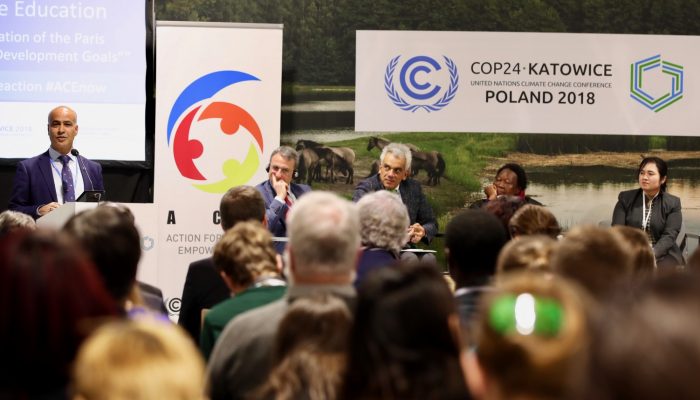
Earlier this month, the 24th Conference of the Parties (COP24), was held in Katowice, Poland. COPs are held annually and provide world leaders, policy workers, scientists and industry leaders with the opportunity to negotiate and determine how best to tackle climate change and reduce emissions on a global level. With so much at stake, these negotiations can be tense.
Some COPs see more action than others. COP24 had relatively high stakes with delegates having to establish a rulebook that will allow the 2015 Paris Climate Agreement to be put into practice in 2020 [1]. The Paris Climate Agreement was established during COP21. It acknowledges climate change as an international threat and that preventing the Earth’s temperature from rising 2°C above pre-industrial levels should be a global priority. Creating a rulebook that will instruct countries on what they must do to achieve this is no easy feat.
This blog will give you some details about what was achieved at COP24, and perhaps more importantly, what wasn’t. But firstly, it will outline what it’s actually like to attend a COP with some personal insights from Sarah Connors, Intergovernmental Panel on Climate Change (IPCC) Science Officer and former EGU Policy Fellow.
Initial impressions from COP24
“What struck me (as a first timer) was all the different levels of meetings, you have the top-level negotiations, which lots of observers can join and even ask questions at some bits (rather than just the official delegates). Sometimes it would be students speaking – which was cool to see. Then there’s smaller negotiation levels going on that are closed”
Activities for COP participants outside of the negotiations and high-level sessions
“The whole meeting is mostly in two halves. There’s the official negations bit and then there are official side events and pavilions that several countries or organisations have paid for where they will have their own smaller events. The IPCC pavilion was something I worked on.”
Then there’s load of other events going on around the city, hosted by NGOs and charities. There’s also the occasional protest. It all felt a bit disjointed at times actually – not sure that’s a good thing.
It’s a bit like EGU in the fact your need to study all the different schedules to see which events you’d like to see/attend.”
Interacting with the policymaking delegates
“In terms of the science-policy interface, the SBSTA events or official side events were opportunities for the IPCC lead scientists to present the findings from the IPCC special report. Delegates got to ask questions there to help understanding.”
A few delegates also came to the IPCC pavilion to ask more about the what the science was saying about the differences between a 1.5°C and 2°C increase in temperature.”
So… What did the COP24 achieve?
The rulebook, which was the key task of COP24 and which will be used as an operating manual after 2020 was, for the most part, agreed upon. This is a positive step because, as UN Secretary General António Guterres, states “A completed work programme will unleash the potential of the Paris Agreement. It will build trust and make clear that countries are serious about addressing climate change” [1].
From 2024, all countries will have to report their emissions (and progress in reducing them) every two years. However, instead of requiring countries to adhere to a single, scientifically sound method of reporting their emissions, the text permits countries to use “nationally appropriate methodologies”. This could result in countries under-reporting their emissions with the land use sector being particularly susceptible to creative accounting [1].
A number of countries pledged to increased their climate pledges in 2020, including: the EU, UK, Argentina, Mexico, India, Canada, Ukraine and Jamaica. Some large private sector companies also made ambitious pledges including Maersk, the world’s largest shipping company, which pledged to eliminate its carbon impact by 2050.
What wasn’t achieved?
1. The IPCC’s Special Report on Global Warming of 1.5ºC wasn’t fully embraced: Although the vast majority of national representatives wanted to “welcome” the report which was commissioned as part of the Paris Agreement, the US, Russia, Saudi Arabia and Kuwait only wanted to “note” the report. This resulted in a watered-down statement which welcomed the “timely completion” of the report and “invited” countries to make use of it. Although this may seem like semantics, it demonstrated the differing levels of engagement in climate action that countries are willing to have and pressed the issue of whether new legislation is effectively using the scientific evidence commissioned by policymakers.
2. Lack of clarity on climate finance: During the Paris Climate Agreement, donor nations committed to mobilising $100 billion annually from 2020 to fund climate action in developing countries. Not only is it uncertain whether donor countries will be able to reach this contribution target by 2020, but there is a lack of clarity as to what constitutes “climate finance”. Can countries report aspects of their development add as “climate action aid” or should this be separated? What are the impacts of this?
3. No agreement on Article 6, voluntary carbon markets: The final decision on Article 6 which sets the rules for voluntary carbon markets (such as carbon credits) will be made during COP25 next year. Carbon credits are given to countries based on their emissions-cutting efforts and carbon sinks, subsequently helping countries to meet their emissions targets. During the COP, Brazil pushed for a change in the wording of the final document which would have allowed each party in the carbon credit trade to make a “corresponding adjustment” to their emissions inventories. There was concern that this clause may allow countries to “double count” the emissions traded and as a result a final decision was not agreed upon this year.
What comes next?
COP25 will now be held in Chile rather than Brazil after Brazil’s president-elect Jair Bolsonaro reneged on hosting the event. During this meeting the final elements of the Paris rulebook will be finalised and work will begin on emissions targets for 2030 and beyond.
Additional reading
- [1] COP24: Key outcomes agreed at the UN climate talks in Katowice, Carbon Brief
- Decoding Article 6 of the COP24 Climate Negotiations
- Maersk pledges to cut carbon emissions to zero by 2050
- A Clean Planet for all. A European strategic long-term vision for a prosperous, modern, competitive and climate neutral economy
- Conference of the Parties (COP)
- Scientists made a detailed “roadmap” for meeting the Paris climate goals. It’s eye-opening.




